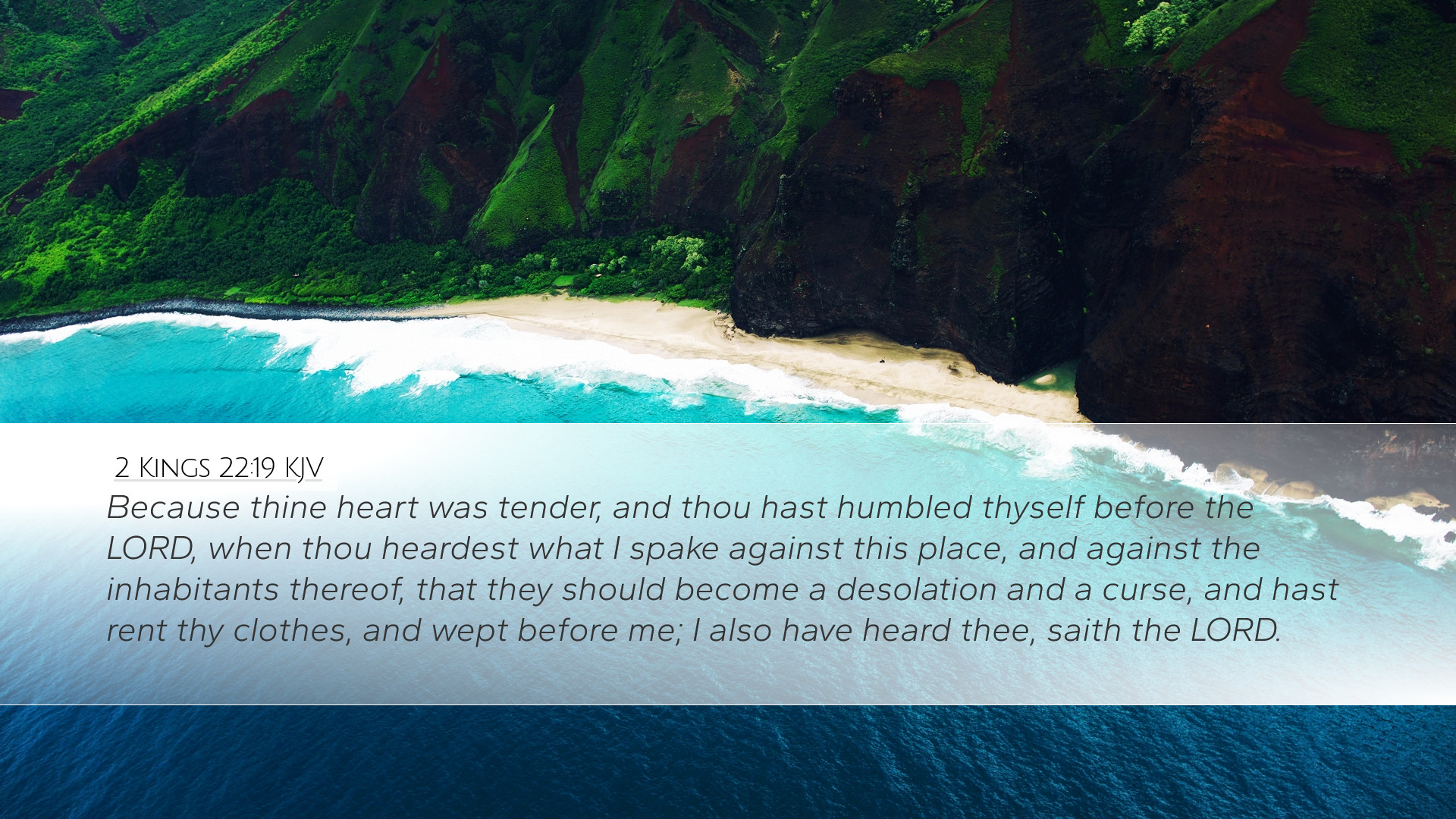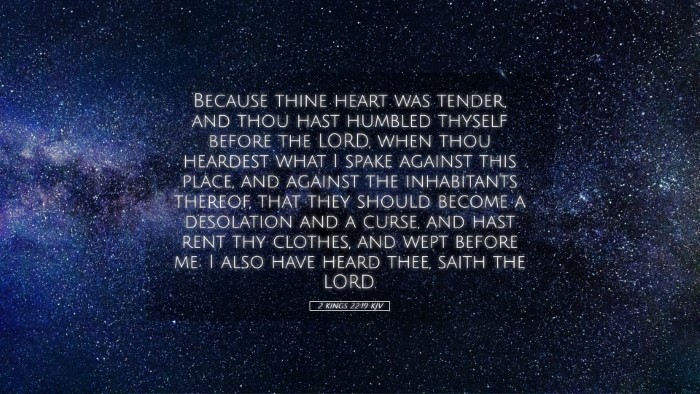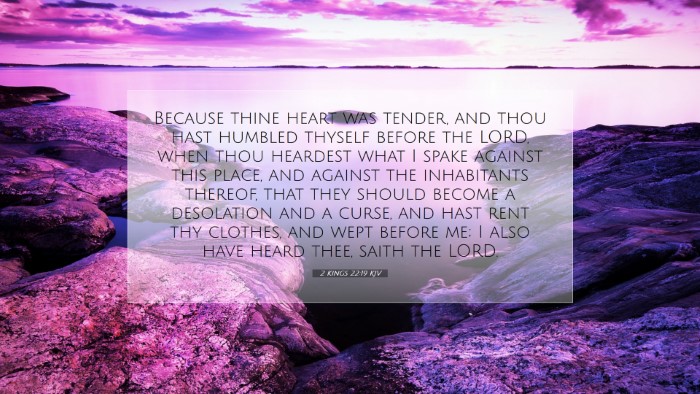Old Testament
Genesis Exodus Leviticus Numbers Deuteronomy Joshua Judges Ruth 1 Samuel 2 Samuel 1 Kings 2 Kings 1 Chronicles 2 Chronicles Ezra Nehemiah Esther Job Psalms Proverbs Ecclesiastes Song of Solomon Isaiah Jeremiah Lamentations Ezekiel Daniel Hosea Joel Amos Obadiah Jonah Micah Nahum Habakkuk Zephaniah Haggai Zechariah Malachi2 Kings 22:19
2 Kings 22:19 KJV
Because thine heart was tender, and thou hast humbled thyself before the LORD, when thou heardest what I spake against this place, and against the inhabitants thereof, that they should become a desolation and a curse, and hast rent thy clothes, and wept before me; I also have heard thee, saith the LORD.
2 Kings 22:19 Bible Commentary
Commentary on 2 Kings 22:19
2 Kings 22:19 states: "Because your heart was tender, and you humbled yourself before the Lord, when you heard what I spoke against this place and against the inhabitants thereof, that they should become a desolation and a curse, and have rent your clothes, and wept before me; I also have heard you, saith the Lord."
Contextual Understanding
This verse is set within a significant narrative in the history of Judah, specifically regarding King Josiah's reign. After the reign of several wicked kings, Josiah initiates a spiritual reform following the discovery of the Book of the Law in the temple. This discovery leads to a profound change in the king’s disposition and response toward God.
Insights from Matthew Henry
Matthew Henry emphasizes the character of Josiah, noting his humility and tenderness of heart as pivotal in God’s communication through the prophetess Huldah. Henry illustrates how God honors those who maintain a soft-heartedness before Him, which is evidenced in Josiah's reaction to God’s decree about Jerusalem’s impending judgment.
Henry expounds on the term "tender heart," noting it signifies one who is sensitive to the things of God. It is this sensitivity that leads Josiah to rend his clothes, a typical sign of mourning and repentance in biblical tradition. Henry states that God takes note of such genuine humility and contrition, promising that He would listen to a heart that is truly sorrowful for sin.
Insights from Albert Barnes
Albert Barnes highlights the importance of personal response to God’s Word as shown by Josiah. He notes that the king’s actions were not merely ceremonial but stemmed from a profound internalization of God's message. Barnes suggests that Josiah's emotional reaction was a direct result of understanding the weight of God's judgment, reflecting a true leader's call to repentance not only for himself but for the nation.
Furthermore, Barnes explains that the phrase "I have also heard you" signifies God's willingness to listen and respond to a repentant heart, reinforcing a theme throughout Scripture: God is responsive to genuine remorse and humility. He emphasizes the gravity of God’s message about the nation’s desolation, reflecting on how leaders must respond deeply and aptly to God's warnings.
Insights from Adam Clarke
Adam Clarke elaborates on the significance of this passage by focusing on the characteristics of authentic piety that Josiah exemplified. Clarke discusses the implications of "rent your clothes" as a heartfelt gesture of repentance in Jewish culture, suggesting that acts of humility often accompanied genuine sorrow for sin and transgression.
Clarke points out that God’s grace is evident in His response to Josiah, where He assures the king that because of his sincere reaction, there would be a delay in the coming judgment and destruction of Jerusalem. He draws attention to the promise of preservation for Josiah, which not only emphasizes God's mercy but also highlights the value of intercession—one man’s piety can affect many. Clarke’s insights propose that personal holiness and repentance can wield significant influence over communal destiny.
Theological Implications
From a theological perspective, 2 Kings 22:19 emphasizes several core themes:
- God’s Mercy: The verse illustrates that God responds to the sincerity of an individual’s heart, showcasing His readiness to extend mercy rather than judgment when genuine repentance is present.
- Leadership & Responsibility: Josiah’s example exemplifies how leaders are charged with the responsibility to respond to God’s Word, which functions as a call to both personal and collective repentance.
- The Importance of a Tender Heart: The significance placed on a tender heart before God reflects a major biblical theme—God values a contrite spirit more than outward rituals.
- Examples of Repentance: Josiah's actions illustrate the process of biblical repentance, including emotional acknowledgment and physical acts that demonstrate one’s commitment to God’s will.
Application for Pastors and Theologians
For pastors and theologians, this verse presents several avenues for exploration and application:
- Preaching on Repentance: The character of Josiah serves as a model for preaching on repentance, encouraging congregations to approach God with tender hearts and a willingness to respond to His Word.
- Leadership Training: This passage highlights the importance of humility in leadership—a vital lesson for church leaders who seek to guide their communities in alignment with God’s desires.
- Emphasizing God’s Response: Pastors can derive comfort and encouragement from the assurance that God listens to genuine responses of repentance, fostering an atmosphere conducive to spiritual renewal.
Conclusion
In closing, 2 Kings 22:19 serves as a potent reminder of the relationship between God and His people, particularly in the ways that He honors heartfelt contrition and humility. The narrative of King Josiah encapsulates essential qualities of true leadership, highlighting the transformative nature of responding to God's Word. Through the insights provided by public domain commentaries, contemporary readers are encouraged to cultivate tender hearts before the Lord, embracing the call to repentance and a deeper relationship with God.


